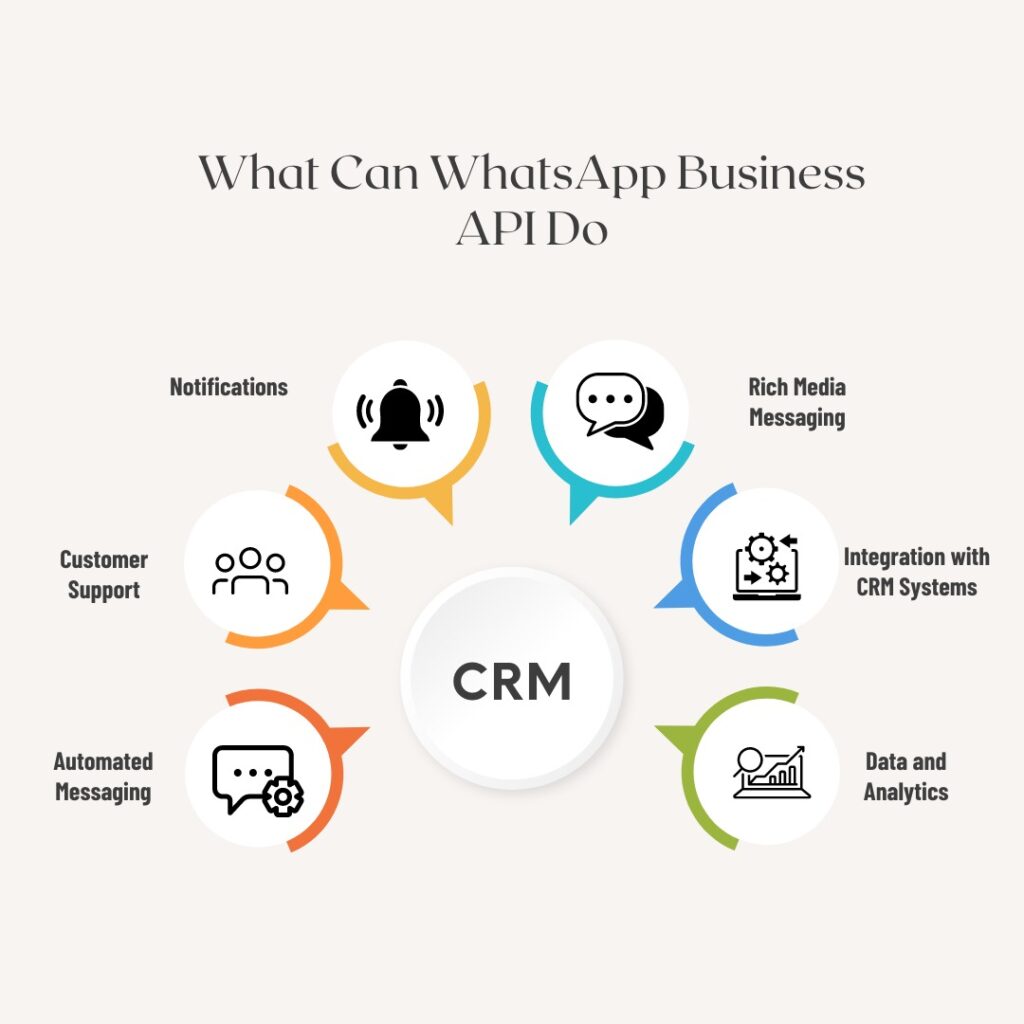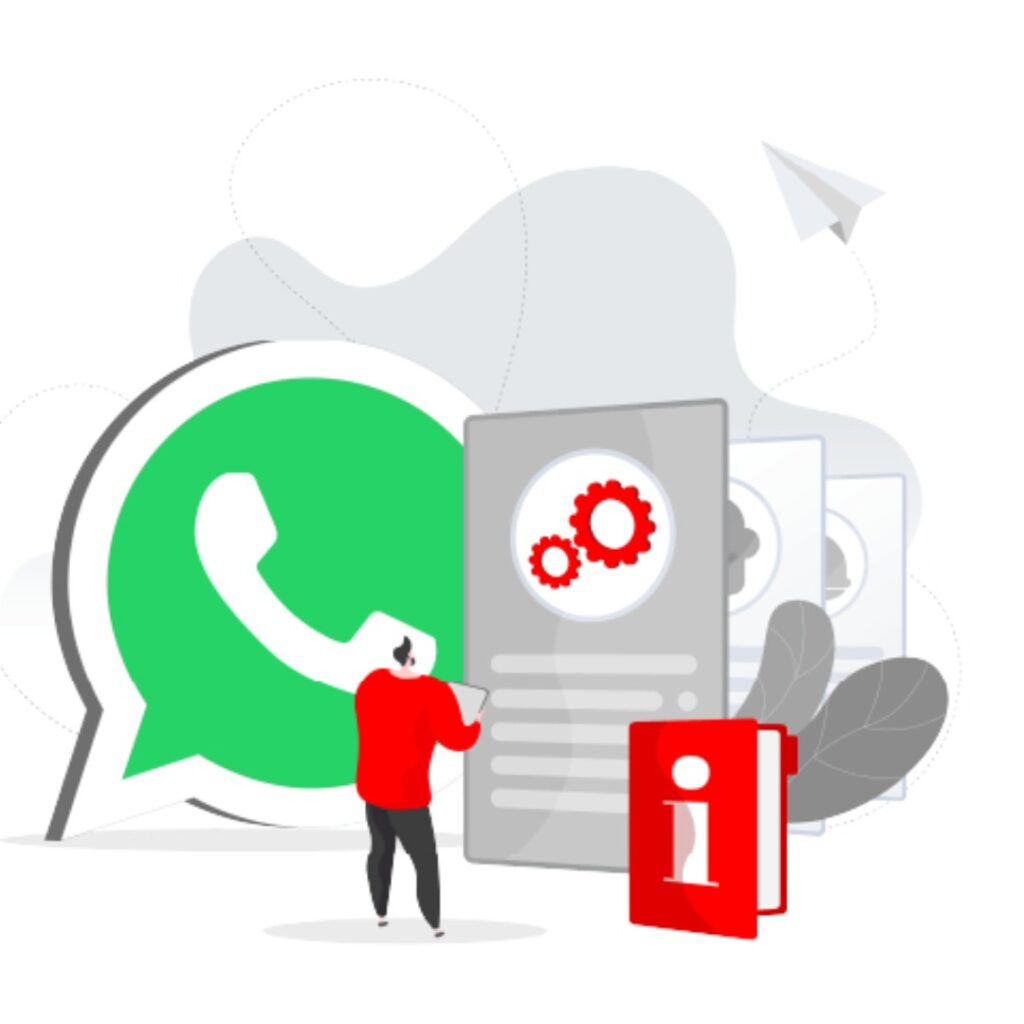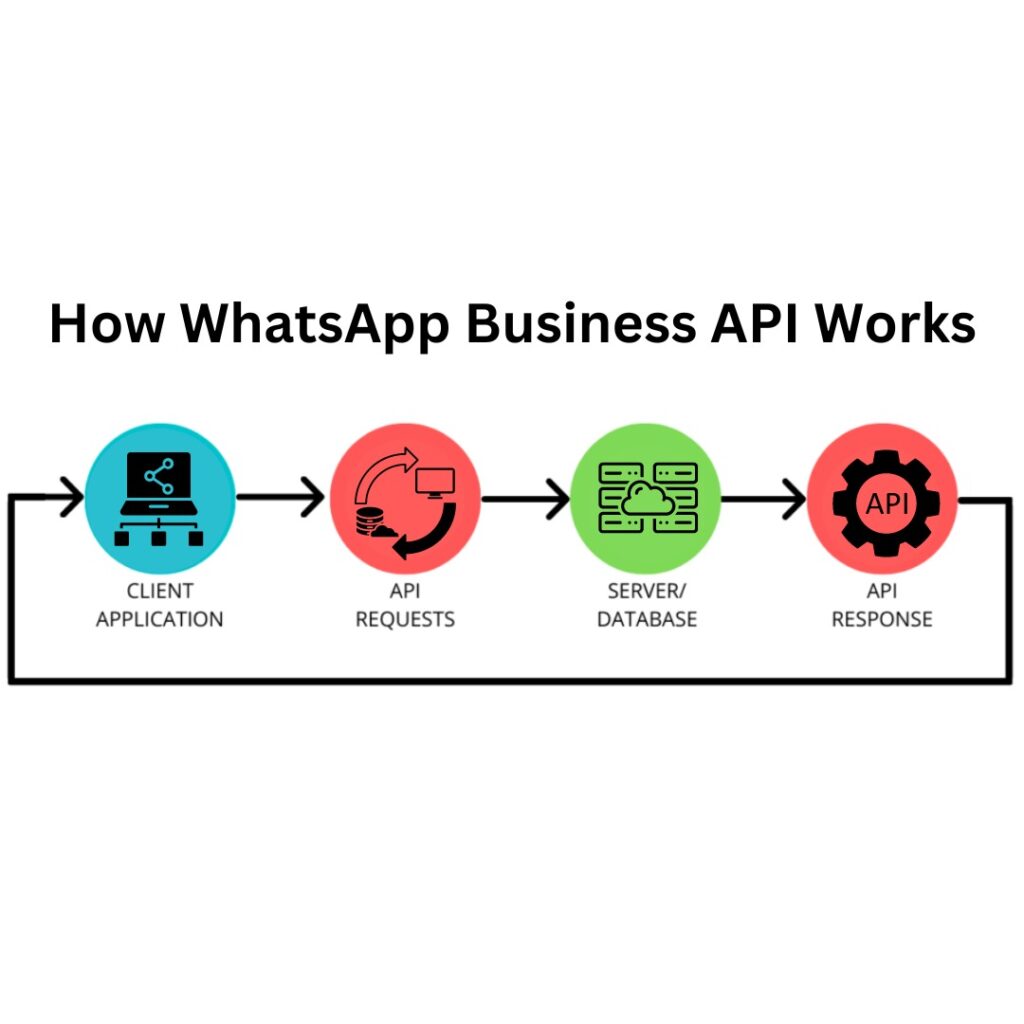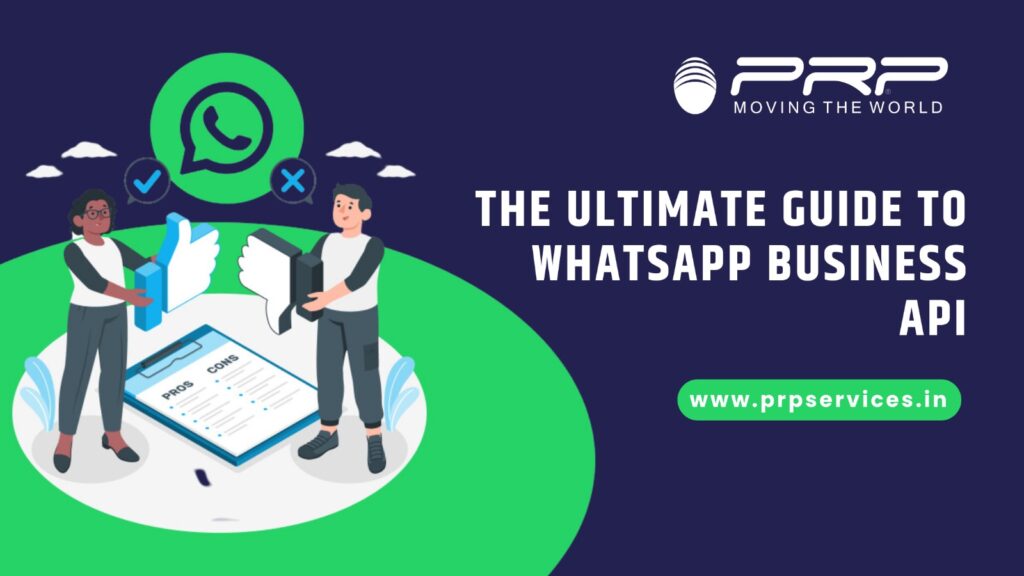The WhatsApp Business API is a game-changer in industries where instant communication is essential for customer satisfaction and business efficiency. This API is designed for medium- to large-size organizations looking to manage customer interactions at scale. Businesses can integrate WhatsApp messaging with their existing systems, automate responses, and provide timely updates and support with it. We provide detailed information on the WhatsApp Business API, including setting up an account and using it to engage customers, support them, and market your brand. This ultimate guide will provide you with the insight and steps you need to harness the power of WhatsApp Business API effectively, whether you want to improve customer service, streamline notifications, or drive marketing campaigns.
What is WhatsApp Business API?
The WhatsApp Business API is a strong solution designed for medium and large businesses to connect with their customers on WhatsApp. Companies can streamline customer interactions at scale by using the API, which offers advanced features and integrations that differ from the standard WhatsApp and WhatsApp Business apps. With this API, businesses can automate messages, send customer support, and notify customers, utilizing the familiar and secure WhatsApp platform.
What is WhatsApp Business API Account?
Business API accounts are essentially gateways that allow businesses to access and take advantage of WhatsApp Business API features. To set up WhatsApp Business API accounts, businesses must partner with a WhatsApp Business Solution Provider (BSP). They are distinct from regular WhatsApp accounts and require an approval process managed by WhatsApp. After WhatsApp is approved, businesses can integrate the API into their customer communications channels, sending and receiving messages programmatically.
What Can WhatsApp Business API Do?
The WhatsApp Business API provides a multitude of functionalities that manage to various business needs. Here are some key features:

- Automated Messaging: Businesses can set up automated messages to provide quick responses to common customer queries, reducing the need for constant manual intervention.
- Customer Support: Companies can use the API to offer real-time customer support, allowing agents to handle multiple conversations simultaneously and improve response times.
- Notifications: The API can be used to send transactional messages like order confirmations, shipping updates, appointment reminders, and more, keeping customers informed every step of the way.
- Rich Media Messaging: Businesses can send rich media messages, including images, videos, and documents, enhancing the communication experience and providing more value to the customers.
- Integration with CRM Systems: The API allows seamless integration with Customer Relationship Management (CRM) systems, enabling businesses to manage customer interactions more effectively and personalize communication.
- Data and Analytics: Through the API, businesses can gather valuable data and insights from customer interactions, helping them make informed decisions and improve their communication strategies.
How to Integrate WhatsApp Business API
Integrating the WhatsApp Business API into your business operations involves several steps:
- Choose a Business Solution Provider (BSP): The first step is to partner with an authorized BSP who will help you set up and manage your WhatsApp Business API account. These providers offer the necessary infrastructure and support to get you started.
- Apply for API Access: With the help of your BSP, you will need to apply for access to the WhatsApp Business API. This involves submitting your business details and use case for approval by WhatsApp.
- Set Up Your WhatsApp Business Profile: Once approved, you can create and customize your business profile on WhatsApp. This includes adding your business name, description, address, email, and website.
- Configure Webhooks: Webhooks are essential for receiving incoming messages and notifications from WhatsApp. Your BSP will help you configure these webhooks to ensure seamless communication.
- Integrate with Your Systems: Integrate the API with your existing systems, such as your CRM or customer support software. This step is crucial for ensuring that all your customer interactions are synchronized and managed efficiently.
- Test and Deploy: Before going live, completely test the integration to ensure everything works smoothly. Once testing is complete, you can open the API and start interacting with your customers on WhatsApp.
How to Get WhatsApp Business API for Free
Getting access to the WhatsApp Business API usually involves costs associated with using a BSP and message rates. However, some BSPs may offer trial periods or promotional packages that allow businesses to use the API for free or at a reduced cost initially. Here are some steps to explore these options:

- Research BSPs Offering Free Trials: Look for Business Solution Providers that offer free trials or introductory packages. These trials can give you a chance to test the API and rate its benefits for your business without immediate financial commitment.
- Sign Up for Promotions: Sometimes, BSPs or WhatsApp may run promotional campaigns that offer free access to the API for a limited period. Stay informed about such promotions by following industry news or subscribing to updates from BSPs.
- Utilize Developer Sandboxes: Some BSPs provide sandbox environments for developers to test integrations before going live. These sandboxes often allow you to use the API for free during the development and testing phases.
- Negotiate with BSPs: If you’re a startup or a small business, you might be able to negotiate with BSPs for discounted rates or extended trial periods. BSPs are often willing to accommodate smaller businesses to build long-term relationships.
WhatsApp Business API Pricing
Basic
Ideal for Startups & Small Businesses.- Admin Based Login
- Free META Business Portfolio Verifications
- Marketing Conversation Rs. 0.78/Session
- All Other Conversation Rs. 0.37/Session
- Max File Size 5MB
- Features : Self-Serve Onboarding & Setup, One-to-Many, Many-to-Many, Scheduling, Templates, Footer Messages, Credit & Debit Report, Delivery Report, Session & Delivery Wise Reports, Downloadable Reports, Live Campaign Report
Standard
Ideal for Growing & Mid-Sized Companies- Admin & Agent Login
- Free META Business Portfolio Verifications
- Marketing Conversation Rs. 0.77/Session
- All Other Conversation Rs. 0.36/Session
- Free 1000 Incoming Conversation
- Max File Size 10MB
- Features : All Basic + Text & Media API, Button Option API, Session API, Location API, Chat Automation - First Level, Multiple API Integrations, Free WhatsApp API Approval, Facebook Verification Support
Advance
Ideal for Enterprise-Level- Role Based Login
- Free META Business Portfolio Verifications
- Marketing Conversation Rs. 0.75/Session
- All Other Conversation Rs. 0.35/Session
- Free 1000 Incoming Conversation
- Max Messages / Day Unlimited
- Max File Size 20MB
- Features : Click2Call API Support, Live Agent Chat Support, Advanced Reports with Detailed Filters, Live Chat Interaction Analysis, All Standard + Conversation & Incoming Reports, Webhook Support, Dedicated Support Manager, Chat Automation, Outer API Acces, Live Campaign Reports
How to Use WhatsApp Business API
Using the WhatsApp Business API effectively requires a strategic approach. Here are some best practices to help you make the most out of the API:
- Define Your Use Cases: Identify the primary use cases for the API, such as customer support, notifications, or marketing. Having clear objectives will guide your integration and usage strategies.
- Automate Where Possible: Support automation to handle routine queries and tasks. Set up chatbots to provide instant responses to common questions, freeing up your human agents for more complex issues.
- Personalize Communication: Use customer data to personalize your messages. Address customers by their names and Convert your responses based on their past interactions and preferences.
- Ensure Compliance: Follow to WhatsApp’s guidelines and policies to avoid issues with your API account. This includes obtaining customer consent before sending messages and respecting their privacy.
- Monitor and Optimize: Regularly monitor your API usage and performance. Determine how well customers are satisfied and analyze metrics such as response times and resolution rates. Use this data to continually optimize your processes.
How WhatsApp Business API Works
The WhatsApp Business API works by allowing businesses to send and receive messages programmatically through the WhatsApp platform. Here’s a simplified breakdown of how it operates:

- Client Application: The client application is the software or system used by the business to manage customer interactions. This could be a CRM system, a custom-built application, or an e-commerce platform integrated with the WhatsApp Business API.
- API Request: When an action is initiated from the client application (such as sending a message or querying message status), an API request is made to the WhatsApp Business API. This request contains necessary details such as the recipient’s phone number, the message content, and any other relevant parameters.
- Service Database: The service database is where all data related to the WhatsApp Business API interactions are stored and managed. This includes message templates, conversation histories, customer data, and any other relevant metadata. When the API request is made, the service database is queried or updated as needed to process the request.
- API Response: After processing the API request, the WhatsApp Business API sends back an API response to the client application. This response contains information about the status of the request, such as whether the message was successfully sent, if there were any errors, or if additional action is required.
Frequently Ask Questions (FAQs)
The WhatsApp Business App is designed for small businesses to interact with customers directly on their phone, whereas the WhatsApp Business API is intended for larger businesses to integrate WhatsApp into their existing systems and handle large volumes of messages programmatically.
Yes, integrating and using the WhatsApp Business API typically requires coding skills or the help of developers, especially to set up webhooks and integrate the API with your existing systems.
Yes, you can use the API for marketing, but you must follow WhatsApp’s guidelines, which include obtaining customer consent and using approved message templates for marketing communications.
Yes, the API uses end-to-end encryption to ensure that messages remain private and secure between you and your customers.
The cost varies based on the BSP you choose and the volume of messages you send. BSPs typically charge a setup fee, monthly subscription fee, and per-message fees.
conclusion
The WhatsApp Business API is a powerful tool for businesses looking to enhance their customer communication and support services. By understanding its features, integration process, and best practices, businesses can hold this API to provide a seamless and efficient customer experience on one of the world’s most popular messaging platforms.

